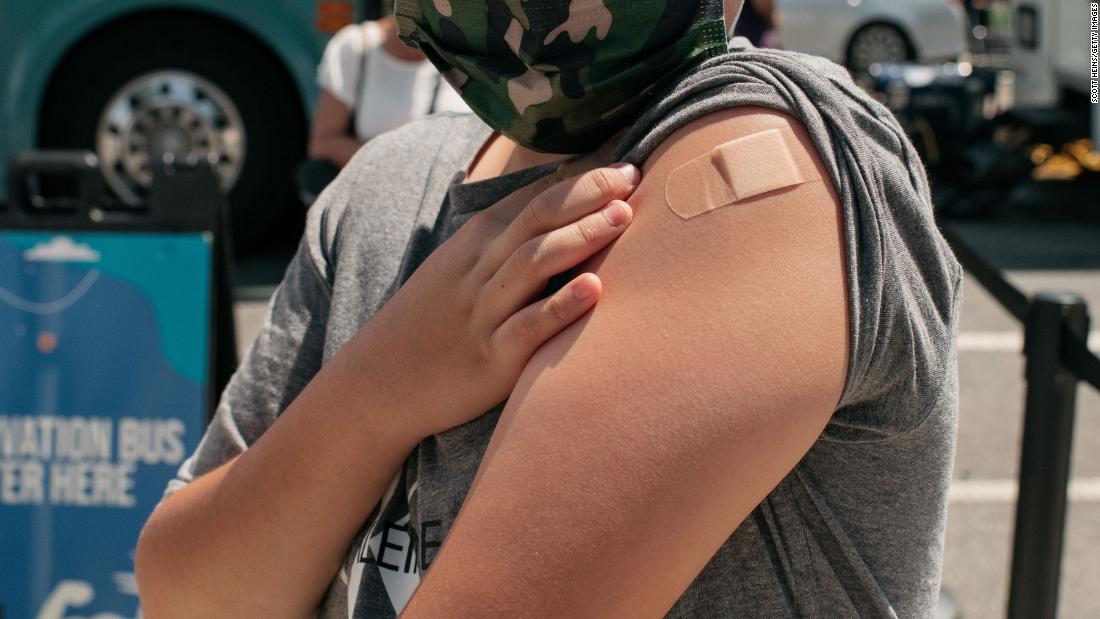FDA expands booster eligibility to adolescents
The agency also shortened the time needed before receiving a booster shot from at least six months after completion of the initial series to at least five months, for everyone 12 and older.
“Throughout the pandemic, as the virus that causes Covid-19 has continuously evolved, the need for the FDA to quickly adapt has meant using the best available science to make informed decisions with the health and safety of the American public in mind,” FDA Acting Commissioner Dr. Janet Woodcock said in a statement. “With the current wave of the omicron variant, it’s critical that we continue to take effective, life-saving preventative measures such as primary vaccination and boosters, mask wearing and social distancing in order to effectively fight Covid-19.”
These recommendations come after an FDA review of real-world data from Israel that showed there were “no new safety concerns” in expanding boosters to adolescents or shortening the timeframe between the initial series and a booster dose.
Specifically, the data showed there were no new cases of myocarditis or pericarditis reported among adolescents who received a booster, according to a statement from the FDA.
The rapid rise in cases across the country made it clear that the benefits of expanding booster eligibility clearly outweighed the risks, FDA leaders said on a call with reporters Monday.
“It made sense to move as quickly as we possibly could,” said Dr. Peter Marks, director of the FDA’s Center for Biologics Evaluation and Research.
These new measures apply to the Pfizer/BioNTech vaccine. A booster shot is still recommended for all adults who received their initial series of the Moderna vaccine at least six months ago or the Johnson & Johnson shot at least two months ago.
As additional data comes in for the other vaccines, the FDA “will take action on that data with all due speed,” Marks said.
Pfizer’s booster dose contains the same amount of the vaccine as the initial doses: 30 micrograms.
Adolescents ages 12 to 15 became eligible to receive their initial series of the Pfizer/BioNTech Covid-19 vaccine in mid-May, opening vaccinations up to about 17 million additional people.
Now, about half of the 12 to 15 population — about 8.7 million — is fully vaccinated, according to data from the US Centers for Disease Control and Prevention. About 5 million of them have been fully vaccinated for more than five months and are now eligible to receive a booster shot.
Children in this age group represent about 5% of the total US population. They account for about 4% of the fully vaccinated population in the US and about 3% of those eligible to receive a booster shot, according to the latest CDC data.
In October, the CDC recommended that everyone age 16 and up who completed their initial series of the Pfizer or Moderna vaccine at least six months ago receive a booster shot, along with those who received their initial Johnson & Johnson shot at least two months ago.
The FDA also authorized a third dose as part of the primary series for certain immunocompromised children ages 5 to 11, including those who have received an organ transplant.
Children younger than 12 are not yet eligible for a booster shot, and many have only become fully vaccinated with their initial series in recent weeks.
“We certainly understand that there is a pressing need in that age range. We understand the hospitalizations that may be occurring in that age range and we will move with appropriate speed but with the appropriate data in hand,” Marks said on Monday.
Overall, about 68.8 million people are fully vaccinated and boosted against Covid-19. That’s less than half of the nearly 180 million people who are eligible to receive their booster shot and about a fifth of the total US population.
And at least 69 million people ages 5 and up have not received their first dose of Covid-19 vaccine, according to the latest CDC data.
“Hopefully this will be not just be a call for people to go get their booster shot, but for the tens of millions of Americans who have not had a chance to consider the implications of not getting vaccinated fully, it’s another chance. It’s not too late to start to get vaccinated,” Marks said.
![]()


